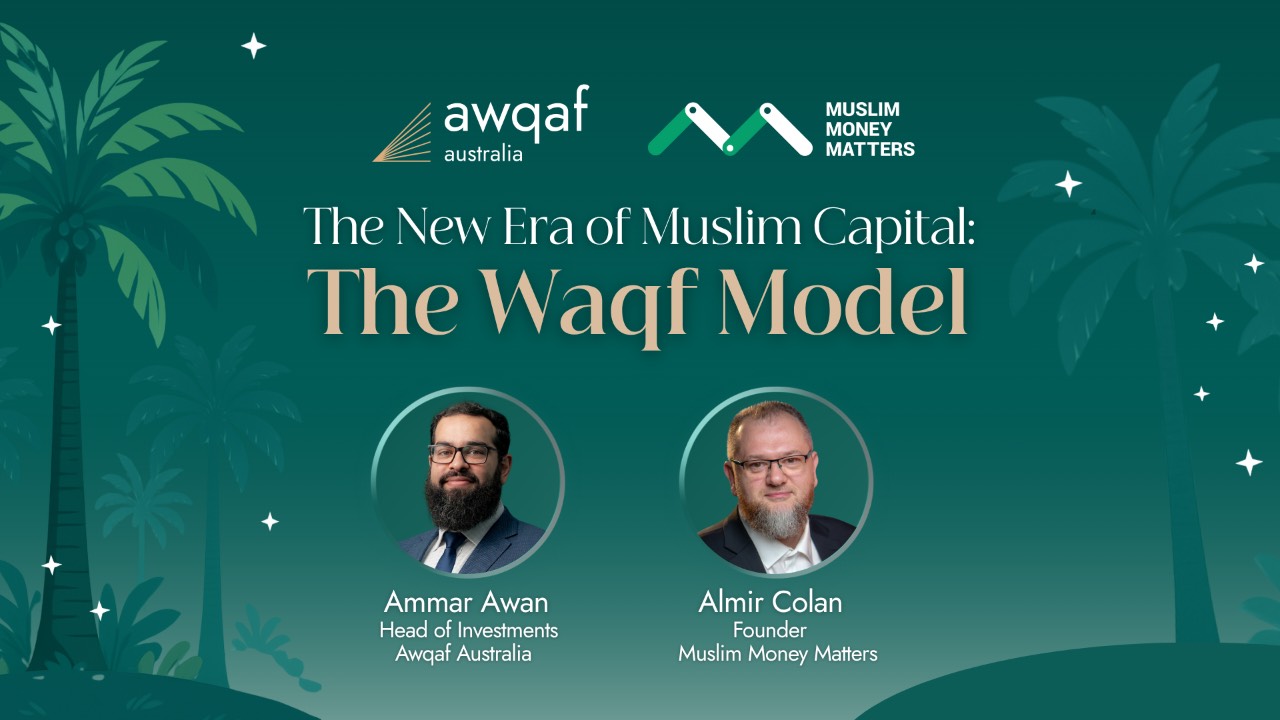My Blog
Sharing things about Islamic Finance, business and other interests...
The New Era of Muslim Capital: The Waqf Model Webinar

Join Ammar Awan (Head of Investments, Awqaf) and Almir Colan (Founder, Muslim Money Matters) for an insightful Zoom session as they discuss Past and Present Waqf Models around the World, and the future of Sustainable charity through purposeful endowments.
Lear more about Awqaf Australia: https://awqaf.org.au/
Learn more about Muslim Money Matters: https://www.muslimmoneymatters.com/
Direct link to Youtube video < here >
Wealth: Blessing or Burden for the Muslim Ummah?

Islamic finance is more than numbers. It’s about empowering the Ummah to create wealth and opportunities. Join Ibrahim and Almir Colan as they explore the road to financial freedom.
Islamic Lessons on Financial Self-Sufficiency

< YouTube Link >
In this video, we talk about the importance of financial self-sufficiency, emphasizing the need for individuals to provide for themselves and their families rather than relying on others.
The discussion includes reflections on the value of work to preserve dignity and avoid the pitfalls of dependency. The video encourages viewers to adopt a productive / Upper Hand mindset, build skills, and contribute positively to their communities and wider economy, guided by Islamic principles.
References used in the video:
“Man by nature needs something to feed him and to provide for him in all the conditions and stages of his life.” - Ibn Khaldun, Muqaddimah
"It is better for anyone of you to carry a bundle of wood on his back and sell it than to beg of someone whether he gives him or refuses."
[Al-Bukhari and Muslim].
"The upper hand is better than the lower hand; the upper hand is that which gives and the lower hand is that which asks." (Sunan an-Nasa'i)
"The person wo...
How to Identify Riba (interest): Buying a Car Example

< YouTube link >
In this video, we talk about Riba (interest/usury) and how to spot it in everyday transactions.
Using a common example of buying a car, we illustrate how one transaction can be done as permissible trade, while another can entail Riba from a loan or money-for-money arrangement. This can be hard to spot if you're not familiar with it, but by the end of this video, you'll be able to recognise Riba confidently, insha'Allah.
Learn More and Support Our Work!
To learn more about Islamic finance and economy and to support MMM in producing future financial literacy videos like this, consider becoming a member of our Muslim Money Matters platform.
🌐 Join us at www.muslimmoneymatters.com
Lawful and Unlawful Business Transactions According to Shariah

< YouTube Link >
In this video, we delve into the Islamic principles that determine the permissibility of commercial transactions. We'll explore the key principles that underpin business and finance matters in Islam.
There are two core principles to establish whether something is impermissible in Islamic financial and commercial matters:
- Explicit Prohibition: We look for evidence that something is explicitly mentioned as prohibited, such as riba (interest), which is clearly forbidden.
- Contrary to Sharia Objectives: If an action goes against the aims and objectives of the sharia and has a detrimental impact on society, it becomes impermissible.
Understanding these principles helps ensure that business and financial activities align with Islamic ethical standards.
Imam Al-Ghazali on Money

< Youtube Link >
Have you ever thought about how Islamic scholars from the past viewed money, its purpose, and its function in society?
Imam Al-Ghazali offers a profound perspective on the true nature of money, describing it as a divine blessing from Allah. He explains that money is created to serve as a universal mediator in trade, acting as a judge between all commodities.
Al-Ghazali emphasizes that the primary function of money is to facilitate fair exchanges, not to be treated as a commodity itself. When money is used merely for trading and profit-making, it disrupts its intended role, leading to economic imbalances and speculative bubbles.
